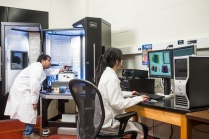Hands-on Experiences
Many of our students get valuable experience while pursuing their bachelor's degree through industrial internships and undergraduate research.
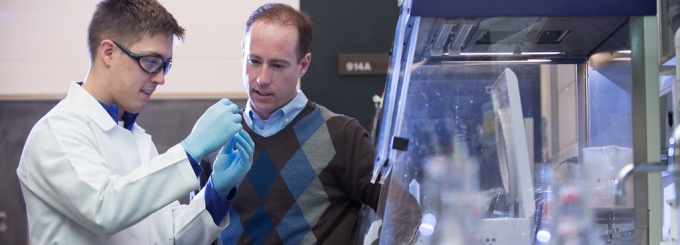
There is nothing more exciting than applying your chemical engineering expertise to work on equipment like that used for actual chemical processes, to be creative in designing useful products and processes, to engage in research and R&D at the frontier of knowledge and practice in scientific laboratory and industrial settings, and to collaborate with mechanical, civil and other types of engineers toward a shared interdisciplinary goal.
Through such activities you acquire a visceral feel and intuition about engineering by literally using your hands in the lab and on the manufacturing floor. Your understanding, instincts and creativity are further honed by pulling together elements of theory and computing to figure out, model and improve existing chemical and biological systems in innovative ways, and to think up new ones.
Chemical Engineering Labs
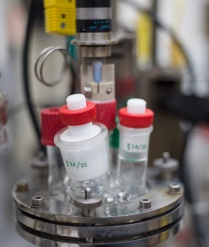
The chemical engineering lab courses that you take throughout your junior and senior years are new experiences transcending what you have done in chemistry and physics labs before. Here you work hands-on with flow systems ranging from commercial pipes to microfluidic cells; heat exchangers; chemical and biological reactors; separation systems such as distillation, absorption, cooling towers, liquid extraction and membrane air separations; as well as other experiments. All are coordinated in lockstep with your lecture courses. You conduct experiments and write up lab reports in teams mirroring real-world teamwork.
Design Courses
In the two capstone senior design courses students work in teams to exercise to design products such as drug delivery systems, and part of an actual chemical plant, such as one producing lactic acid as a feedstock for the manufacture of environmentally friendly corn plastic.
The CE404 and CE408 design courses allow you to be creative, make decisions, and gain experience writing professinal reports that prepare you to make real-world engineering judgments and communicate them effectively.
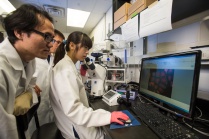
Interdisciplinary Connections
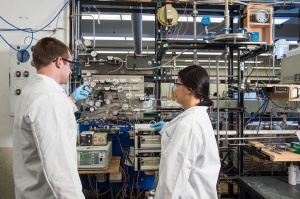
Chemical engineers specialize in the design of a piece of process equipment such as a distillation column in terms of a specification of the column height and diameter, operating conditions (temperature and pressure), and material of construction based on chemical challenges posed by the mixture being distilled. The actual mechanical design is not undertaken by chemical engineers, but rather by mechanical and civil engineers. They work out how to actually build the exterior vessel of the column and its internal parts, in particular determining how strong and therefore how thick the metal needs to be. This parameter is needed for the economic analysis by the chemical engineers, because cost estimates are based on the mass of steel or alloy, which follows directly from the thickness.
As a student team in CE408, you can become the client of a team of mechanical and civil engineers who carry out the mechanical design for your distillation column for course credit as a SEAS extramural project, mentored by an experienced practicing mechanical engineer. It is really exciting to sit in CE408 and listen to a presentation by the mechanical and civil engineers you retained, as they tell you how thick the steel needs to be for the distillation column that you designed. This information allows you to figure out how much it will cost. Such connections between different branches of engineering are exciting, and prepare you for the many instances of interdisciplinary collaboration you will be involved with in your career.
Internships
We have developed relationships with various local companies and strongly encourage students to do internships with them to prepare for entering the workforce. An ideal time to do an internship is the summer between your junior and senior years, although many students also do them during the fall or spring semester. Some companies offer internships to sophomores as well. Internships are a great professional experience, and they look very attractive on your resume. Based on their positive experience with a student, companies often offer permanent jobs to interns before they graduate.
Aside from the money earned, you can also receive course credit for an internship, which satisfies the requirements for one CE Technical Elective.
Undergraduate Research
Just as internships are ideal preparation for an industrial position after graduation, so undergraduate research is ideal preparation for subsequent graduate study, and looks very attractive on a graduate school application. Here the scientific work is performed in an academic setting, namely the experimental or computational laboratory of a CBE faculty member, as opposed to a company. Many faculty members have undergraduates assisting in their labs, who can become co-authors on published papers on which they have made a contribution.
To get started, contact Marlo Roetzer, CBE Academic Advisor.
